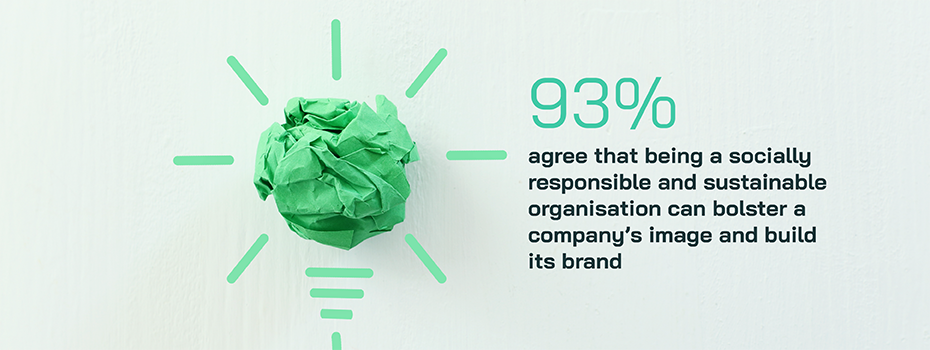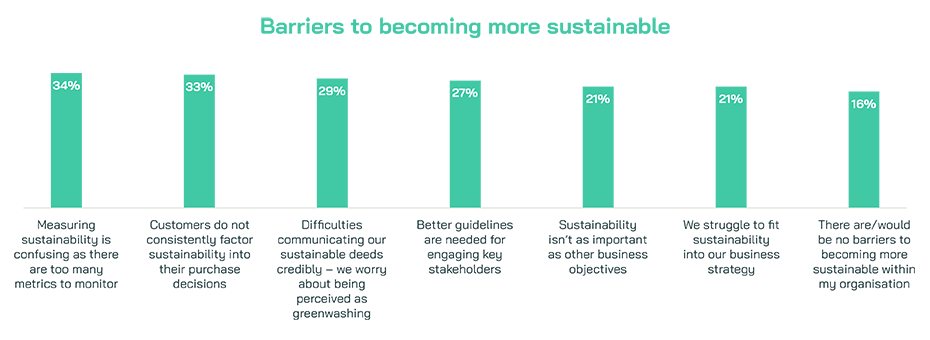Sustainability has already become a mainstream topic across society, governments, consumers, and organisations and it doesn’t seem to be slowing down any time soon.
In the context of businesses more specifically, greater acknowledgement and awareness of sustainable practices has been something that has grown in relevance, and even gone as far as being integrated into business strategies and operations. It’s become less optional or “nice to have”, and more of an expectation, in terms of considering impacts on the environment and society.
In the wake of World Environment Day, we asked IT decision makers across the UK and US about what their organisations are currently doing in the interests of sustainability and their plans for the future. Here’s what they told us…
Sustainability plays a pivotal role in business
All (100%) report that environmental and sustainability elements are already integrated into their overall business strategy to at least a little extent, highlighting how key sustainability already is to business practices.

From a sector perspective, those surveyed from the IT, technology and telecoms sector were more likely to be integrating sustainability into their business strategy to a great extent (55%) compared to others, particularly business and professional services where around a third (36%) report this to be the case.
Given how technology has helped organisations in more ways than one, particularly since the start of the pandemic, it’s unsurprising that this sector demonstrates being further ahead in terms of sustainability efforts too – especially given that almost eight in ten (78%) report their organisations are using technology solutions which are more sustainable.
A little goes a long way: How micro efforts can lead to macro-outcomes
All (100%) surveyed respondents report that their organisations are participating in at least one micro-sustainable activity. Setting up recycling bins in common areas (57%), reducing paper waste (50%), and switching to energy-efficient lightbulbs (50%) are just a few of the ways that businesses are making little changes. Small scale environmental measures such as these can ultimately impact the environment through a larger cumulative impact. A focus on individual efforts and behaviours, as well as education and attitudinal changes result in an environmentally conscious individual. And if more individuals become environmentally conscious, then actually, they’re more likely to encourage larger scale changes with even greater positive impacts.
Using technology solutions which are more sustainable (61%), making supply-chain changes to encourage suppliers to become more sustainable (48%), and becoming carbon neutral in their processes (46%) are areas where organisations are stepping up and making more drastic changes to positively influence the environment. With the vast majority (93% ) also agreeing that being a socially responsible and sustainable organisation can bolster a company’s image and build its brand, it makes sense as to why there’s a wider interest across this area.

Organisations who seek to incorporate sustainable values into the business can expect to see wider benefits, with almost all (99%) reporting at least one benefit to being sustainable. Improved reputation (50%), opportunities for cost savings (45%), and increased customer loyalty and retention (43%) are just a few of the experienced and perceived benefits to adopting a sustainable mindset in business. It’s clear that organisations are thinking of ways in which they can remain relevant and appeal to their customer base, whilst making improvements both externally as a brand, and internally with their own employees.

What’s the hold up?
With a seemingly endless list of benefits to an organisation becoming more sustainable, one might wonder why all organisations aren’t joining the bandwagon to increase their sustainability credentials. So, what are the perceived barriers to becoming more sustainable within an organisation.
One of the leading barriers cited by the ITDMs was its impact on the bottom line. A third (33%) stated that sustainability is not a consistent factor driving their customers’ purchase decisions, with just over a fifth (21%) stating that sustainability isn’t as important as other business factors. More than a quarter (27%) also state that better guidelines are needed for engaging key stakeholders, indicating positive intent among the wider workforce overall.
Organisations may however be underestimating their current efforts in implementing sustainable practices. The leading barrier to becoming more sustainable within their organisation is its ability to be measured effectively, with around a third (34%) reporting too many metrics to monitor. A further 29% stated difficulties in communicating their sustainable deeds credibly, with a fear of being perceived as greenwashing.

Sustainability credentials have an impact both outside and within the organisation
As noted in our March 2021 Beneath the Surface article – ethical and sustainable IT sourcing, it is now common practice for enterprise organisations across the globe to communicate a corporate social responsibility and sustainability element within their 5–10 year vision or purpose. It’s no surprise then that, over a year later and in an already saturated market, organisations are increasingly looking for ways to differentiate themselves among their competitors to existing customers and prospects, and a vast majority (94%) of those now surveyed agree that sustainable organisations can stand out from the competition.
This differentiation permeates an organisation’s walls and extends to its own employees. Almost nine in ten (88%) agree that greater productivity and boosted morale from sustainability programs have a positive impact on how profitable an organisation can be. This sentiment may be driven by the US, with almost half (49%) of those surveyed across the pond strongly agreeing, a view shared by under a quarter (23%) of their UK counterparts.
Despite recognition of the value behind sustainability in business, organisations could be doing a lot more in consideration of their impact on the environment and society. In fact, almost all (96%) felt that their organisation could do more to focus on sustainability and its environmental impacts. With those in the US (38%) more inclined to feel strongly than those in the UK (20%), this may be down to those in the UK feeling that environmental and sustainability elements are already integrated into their organisation’s overall business strategy to a greater extent than their US colleagues (48% versus 42% respectively).
Conclusion
While implementation of sustainable practices may yet be in their infancy, given the confusion in their effective measurement, it’s fair to say that certain organisations may be further ahead in their journey to a more sustainable future than they realise. Those lagging behind may find it prudent to focus on such practices in order to attract and retain the best talent while also setting themselves apart from competitors within an otherwise crowded space.
In the current financial climate, many organisations are looking to economise, with spend under increasing scrutiny. With opportunities for cost saving as one of the leading perceived benefits of sustainable practices within an organisation, perhaps increased investment is needed now more than ever to secure longer-term prosperity.
Indeed, can an organisation itself remain sustainable without the successful implementation of sustainable practices? Organisations need to integrate sustainability into their brand strategy and ethos, measuring its efficacy as part of a comprehensive brand research program. Only through understanding its position within the market can an organisation implement the changes necessary to ensure its continued relevance and success.
Vanson Bourne has a wealth of experience designing extensive brand research programs. Get in touch to find out more.
Methodology
319 IT decision makers from across the US and UK were interviewed in May 2022. All respondents were from organisations in the private sector, with 1,000 or more employees.



